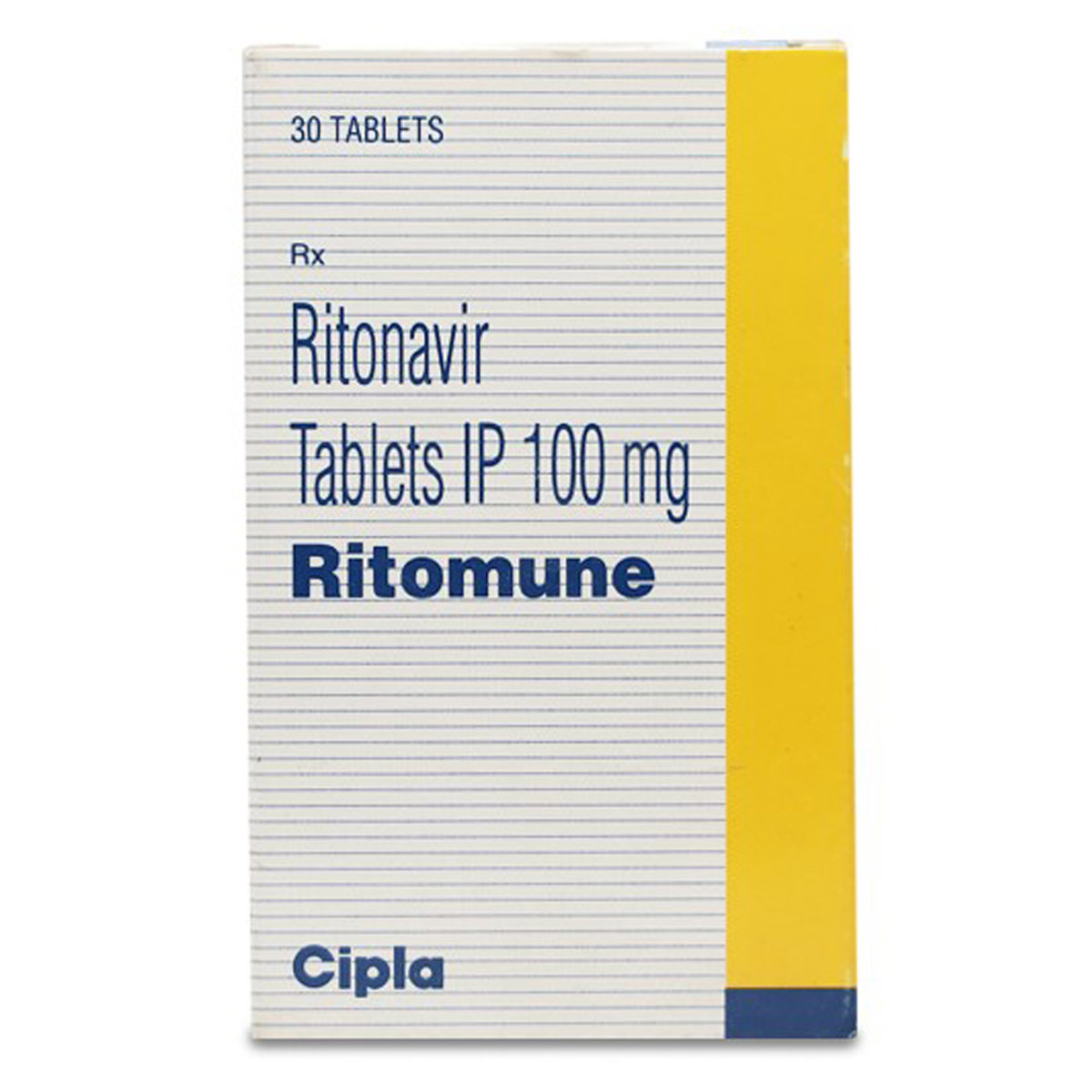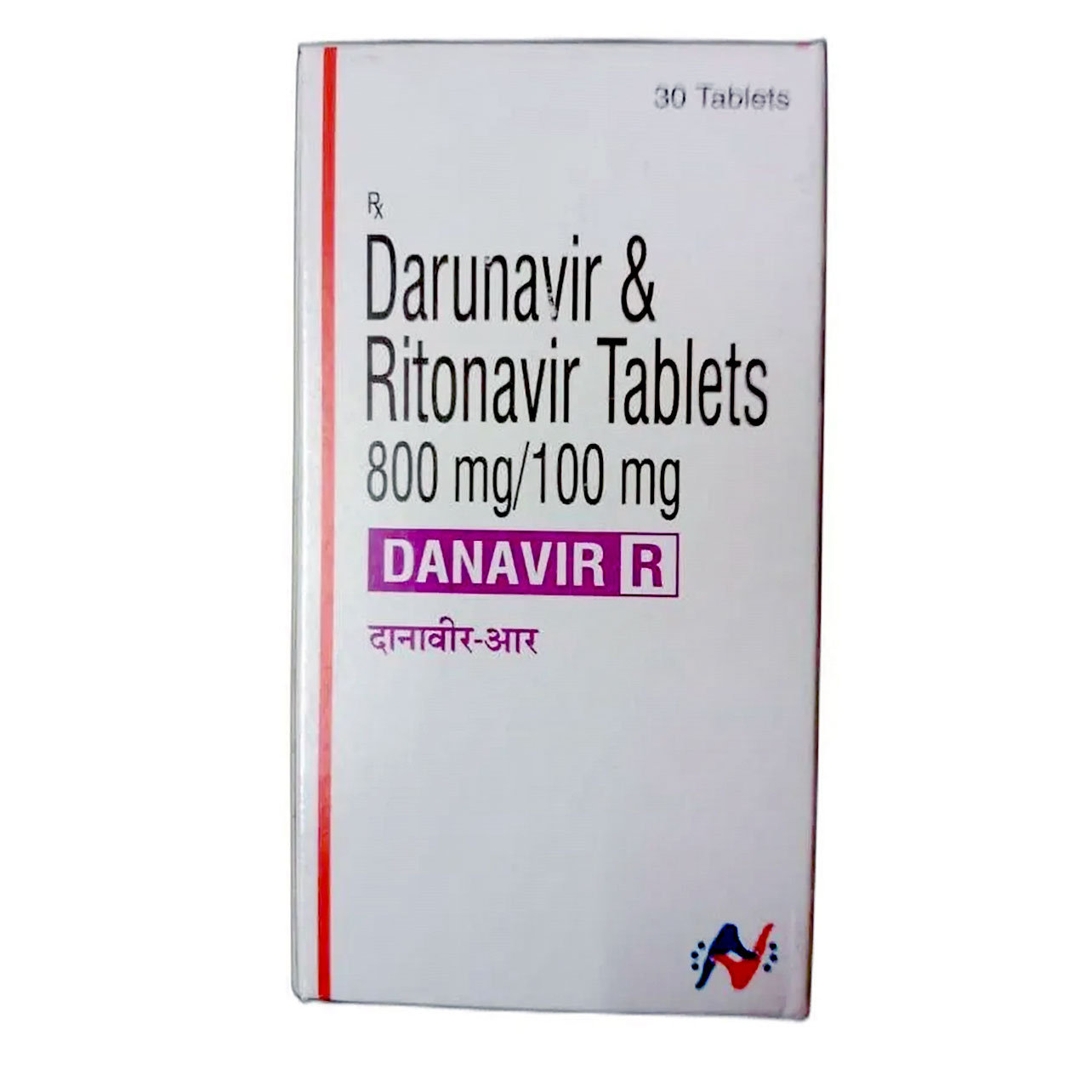Ritonavir
About Ritonavir
Ritonavir belongs to a class of drugs called antiretroviral medications primarily used to treat HIV infection. It may also be used to treat Covid-19. HIV is a virus that targets the immune system, primarily white blood cells. HIV destroys white blood cells and reduces a person's resistance to infections. Coronavirus disease, also known as SARS-CoV-2 (Severe Acute Respiratory Syndrome Corona Virus 2), is an infectious disease caused by the coronavirus.
Ritonavir contains 'Ritonavir', which is a protease inhibitor. It works by interfering with an enzyme called protease which is necessary for virus replication. This prevents the spread of new viruses. As a result, Ritonavir lowers the virus load in the body and aids in treating infections.
Take Ritonavir as prescribed by your doctor. You are advised to take Ritonavir for as long as your doctor has prescribed it for you based on your medical condition. In some cases, Ritonavir may cause diarrhoea, nausea, vomiting, abdominal pain, and stomach upset/indigestion. Most of these side effects of Ritonavir do not require medical attention and gradually resolve over time. However, if the side effects persist or worsen, please consult your doctor.
Please do not take Ritonavir if you are allergic to any of its ingredients. Seek medical advice before taking Ritonavir if you are pregnant or breastfeeding. Ritonavir may cause dizziness, so drive only if you are alert. Ritonavir is not recommended for children below 2 years. Avoid consuming alcohol along with Ritonavir as it could lead to increased dizziness. Keep your doctor informed about your health condition and medicines to rule out any side effects/interactions.
Uses of Ritonavir
Medicinal Benefits
Ritonavir belongs to a class of drugs called antiretroviral medications primarily used to treat HIV infection. It may also be used to treat Covid-19. Ritonavir is a protease inhibitor that works by interfering with an enzyme (protease) required by the virus-infected cells to produce new viruses. As a result, Ritonavir lowers the viral infection in the body.
Directions for Use
Storage
Side Effects of Ritonavir
- Nausea
- Abdominal pain
- Vomiting
- Diarrhoea
- Stomach upset/indigestion
- Dizziness
- Tingling sensation or numbness
Drug Warnings
Please do not take Ritonavir if you are allergic to any of its ingredients; if you have severe liver disease. Inform your doctor if you have liver disease, haemophilia, erectile dysfunction, diabetes, kidney problems, or if you are taking any other medicines. Consult your doctor before taking Ritonavir if you are pregnant; your doctor will prescribe only if the benefits outweigh the risks. Breastfeeding should be avoided to prevent the transmission of infection to the baby. Ritonavir may cause dizziness and weakness, so drive only if you are alert. Ritonavir should not be given to children below 2years as safety and effectiveness have not been established. Avoid consuming alcohol along with Ritonavir as it could lead to increased dizziness. Talk to your doctor immediately if you notice any signs or symptoms of infection or inflammation. Practise safe sex and take other necessary precautions as Ritonavir does not prevent the spread of HIV infection. Keep your doctor informed about your health condition and medicines to rule out any side effects.
Drug Interactions
Drug-Drug Interactions: Ritonavir may interact with similar category anti-viral medications (e.g. emtricitabine, tenofovir alafenamide, raltegravir, atazanavir) medicines used to lower cholesterol (e.g. atorvastatin), medicines used to relieve moderate to severe pain (e.g. oxycodone), and medicines used to treat depression (e.g. sertraline).
Drug-Food Interactions: Consuming alcohol while using Ritonavir is not recommended since it may induce unpleasant side effects or make you more sensitive to the effects of alcohol.
Drug-Disease Interactions: Inform your doctor before taking Ritonavir if you have haemophilia, hepatotoxicity, hyperglycemia, hyperlipidemia, erectile dysfunction, kidney disease, and heart problems.
Drug-Drug Interactions Checker List:
Safety Advice

Alcohol
unsafeAvoid drinking alcohol with Ritonavir as it may cause increased dizziness.

Pregnancy
cautionIf you are pregnant or planning to become pregnant, please seek medical advice. Pregnant women are only given Ritonavir if their doctor believes the benefits outweigh the risks.

Breast Feeding
unsafeRitonavir may pass into breastmilk. Breastfeeding should be avoided to prevent transmission of infection to babies.

Driving
cautionRitonavir may cause dizziness. Do not drive or operate machinery unless you are alert.

Liver
cautionTake Ritonavir with caution, especially if you have a history of liver diseases/conditions. The dose may be adjusted by your doctor as required. Avoid taking Ritonavir if you have severe liver problems.

Kidney
cautionRitonavir should be used with caution, especially if you have a history of kidney disease or condition. Please seek medical advice. Your doctor may adjust the dose if necessary.

Children
cautionRitonavir is not recommended for children below 2years.
Habit Forming
Diet & Lifestyle Advise
HIV:
- Never exchange personal objects that have been contaminated with body fluids or blood, such as razor blades or toothbrushes.
- Never share used needles and other injection or drug equipment as it may spread viruses.
- Consume a well-balanced diet. Consume vitamin and nutrient-rich foods like dark-green, yellow, orange, and red vegetables and fruits to enhance your immune system. Choose lean protein and whole carbohydrates over-processed foods.
- Consume no raw meat or eggs. Consume boiled and cooked meat, poultry, or seafood.
- If you have nausea or vomiting, eat bland, low-fat foods and avoid spicy or greasy foods.
- Spending time with family or doing whatever makes you happy might help minimise emotional and physical stress.
COVID-19:
- Always remember to wear a mask when you're around other people. Wearing a mask aids in the prevention of illness spread.
- Keep a social distance and avoid social gatherings.
- Do not touch your eyes, nose or mouth if your hands are not clean.
- Hands should be washed with soap and water or an alcohol-based sanitiser on a regular basis.
- Surfaces should be cleaned and disinfected on a regular basis.
- Gargling with salt water and inhaling steam would be beneficial.
Special Advise
- Appropriate laboratory testing should be performed prior to starting Ritonavir and at regular intervals or if any clinical signs or symptoms appear during therapy.
- In case of a fever or rash following Ritonavir, do not use any antipyretic or anti-allergic medicines without consulting the doctor.
Patients Concern
Disease/Condition Glossary
HIV infection: HIV (human immunodeficiency virus) is a virus that damages immune system cells and impairs your ability to fight infections and diseases. People with HIV experience flu-like symptoms such as fever, chills, rash, night sweats, muscle aches, tiredness, and sore throat. These symptoms usually last for days to several weeks. It spreads through body fluids such as semen, vaginal fluid, and blood. If left untreated, this condition can lead to AIDS (Acquired Immunodeficiency Syndrome). It is a life-long condition, and there is no definite cure. However, it can be controlled by treatment with antiretroviral drugs.
COVID-19: Coronavirus disease, also known as SARS-CoV-2 (Severe Acute Respiratory Syndrome Corona Virus 2), is an infectious disease caused by the coronavirus. Coronavirus belongs to a group of RNA viruses and has crown-like projections on the pathogen's surface. The virus transmits through droplets generated from an infectious person's cough, sneeze or heavy breathing. The common symptoms of Coronavirus disease are dry cough, breathlessness, shortness of breath, tiredness, body pains, headache, fever, loss of sense of taste and smell, diarrhoea, and sore throat.
FAQs
Ritonavir works by inhibiting the working of a protease enzyme that is essential for the reproduction of the virus. Thereby, it prevents the production of the new virus. Thus, Ritonavir lowers virus load in the body and helps treat the infection.
Please consult your doctor if you are diabetic as Ritonavir may develop/worsen diabetes. Regular monitoring of blood sugar levels is advised.
HIV infection is not cured by Ritonavir as there is no definite cure for HIV. Ritonavir decreases the amount of HIV virus in the body and increases immune system performance.
If you miss a dosage of Ritonavir, take it as soon as possible and then resume your usual dosing plan. If it is almost time for your next dose, skip the missing dose and take the scheduled dose. Do not double the dose.
Inform your doctor if you are taking atorvastatin. Combining these drugs may elevate atorvastatin levels in the blood. This increases the chance of side effects such as liver damage and rhabdomyolysis, an uncommon but deadly illness characterised by the breakdown of skeletal muscle tissue.
You are recommended to inform your doctor before taking any other medicines with Ritonavir. Your doctor will notify you regarding medicines that should not be taken along with Ritonavir.







